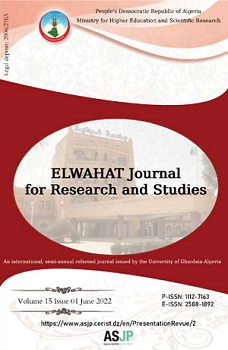دور المقاول في ترشيد السلوك البيئي للمؤسسة "دراسة استطلاعية على عينة من المقاولين بولاية الأغواط"
Abstract
This paper seeks to identify the role of entrepreneur in rationalization the environmental behavior through an exploratory study on a sample of entrepreneurs in Laghouat city, the study identified by a researched variable represent in (the environmental behavior) and by an independent variable represent in (the entrepreneur behavior) who identified three internal variables represented in (legal behavior , ethical behavior and voluntary behavior) and as an external variable represent restructuring Entreprise included (entrepreneurial activity, creation day and size).
To achieve the study objectives, questionnaire was developed for the purpose of collecting data from respondents, and reached a population of 35 single, we used Statistical Package for Social Sciences (SPSS) for analysing questionnaire data, depending on the mean, regression and variance analysis and other statistical methods analysis, it has reached some results, most notably:
- That all external variables (entrepreneurial activity, creation date, size) contribute to determine the environmental behavior.
- The internal variable (legal behavior) Contribute directly in the rationalization of environmental behavior.
- There is no role for the voluntary and moral behavior of the entrepreneur in the rationalization of environmental behavior.
The study recommends the end the need to respond the entrepreneur with the requirements of sustainable development by changing his behaviors and actions to the environmental resources to be more moderation and less consumption of natural resources, especially since the study had concluded that there is only a role for legal behavior, without the voluntary and ethical behavior of the entrepreneur in the rationalization of environmental behavior.
Key words: environmental behavior, legal behavior, moral behavior, voluntary behavior, entrepreneur.
References
1- السكارنة، بلال خلف (2008)، الريادة وإدارة منظمات الأعمال، دار المسيرة للنشر والتوزيع، عمان.
2- الشيخ، محمد صالح (2002)، الآثار الاقتصادية والمالية لتلوث البيئية ووسائل الحماية منها، مصر.
3- دردار، فتحي (2002)، البيئة في مواجهة التلوث، الجزائر.
4- الدوري، زكريا مطلك وبوسالم، أبو بكر (2013)، "الثقافة الريادية في ظل التنمية المستدامة دراسة ميدانية على شركة سوناطراك البترولية الجزائرية"، مجلة ديالي، العدد 58.
5- بابكر، مصطفى (2004)، "السياسات البيئية"، مجلة جسر التنمية، العدد25، الكويت.
6- باشي، أحمد (2003)، "دور الجباية في مكافحة التلوث"، مجلة العلوم الاقتصادية وعلوم التسيير، العدد9، الجزائر.
7- كتانة، خيري مصطفي وأغا، أحمد عوني أحمد (2012)، "عناصر استراتيجيات الريادة وأثرها في ابعاد إبداع المنتج دراسة من وجهة نظر العاملين في مركز الأطراف الصناعية في الموصل"، أبحاث اقتصادية وإدارية، العدد 11.
8- الدوري، زكريا مطلك وبوسالم، أبو بكر (2012)، "المسؤولية الاجتماعية والبيئية كمدخل لتحقيق التنمية المستدامة "في عينة من المؤسسات الصغيرة والمتوسطة الجزائرية"، الملتقى الدولي الثالث حول: منظمات الأعمال والمسؤولية الاجتماعية، جامعة بشار.
9- القانون رقم: 03-10 المؤرخ في: 20/07/2003 المتعلق بحماية البيئة في إطار التنمية المستدامة (الجريدة الرسمية رقم 43).
ثانيا- المراجع باللغة الأجنبية:
10- BONNJEUX, François. et DESAIGUES, Brigitte. (1998), Economie et politique de l’environnement, Paris.
11- DRUID, Nelson.(2001), An interface Between Entrepreneurship and Innovation, SMES perspective, New Zaland.
12- FAUCHEUX, Sylvie. et NOEL, jean-Françoi. (1995), économie des ressources naturelles et de l’environnement, Paris.
13- HISTRICH, Robert. and PETER, Michael. (2000), Entrepreneurship,5th ed Mc Graw –hill Co. Irwin, New York.
14- KURATKO, Danald. and HODGETTS, Richard. (2001), Entrepreneurship A contemporary Approach, 5th ed Forth worth: arcourt college Publishers New York.
15- AJZAN, I. (1991), “The theory of planned behavior”, Organizational Behavior and Human Decision Processes, Vol.50, P.P 179-211.
16- COTTRELL, Stuart. (2003), “Influence of Socio demographics and Environmental Attitudes on General Responsible Environmental Behavior among Recreational Boaters”, Environment and Behavior, Vol. 35, No. 3, P.P347-375.
17- HSU and ROTH (1998), “An assessment of environmental literacy and analysis of predictors of responsible environmental behavior held by secondary teachers in the Huatlien area of Taiwan”, Environmental Education Research, Vol.4, N0.3, P.P:229-249.
18- OCDE (2003), Les approches volontaires dans les politiques de l’environnement : Efficacité et combinaison avec d’autres instruments d’intervention, OCDE, Paris.
19- PAVON, José Alfonso. (2009), Entrepreneurship and the business plan, Jonkoping university, Sweden.
20- BUTEL, Béatrice Bellini. (1997), l’intégration de la donnée écologique dans la gestion de l’entreprise : une analyse contingente au niveau des sites de production, Thèse de Doctorat, Université des sciences et technologies, Lille, France.
21- REYNAUD, Emmanuelle. (1997), Les déterminants de comportement de protection de l’environnement des entreprises, Thèse de doctorat, Institut d’Administration des Entreprises, Marseille.
21- DORNELAS, Jose (2014), corporate entrepreneurship: the case of Brazil and Argentinaon-line, article available on<www.icesi.edu.co/ciela/anteriores/Papers/emcor/2.pdf>, (consulted: 28/04/2014).







